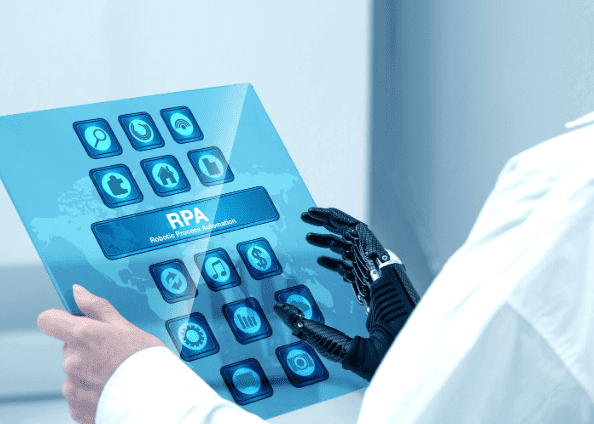Artificial intelligence, once a mere Darwinian theory of the distant future, is currently reshaping U. S. healthcare on a very practical level.AI in healthcare enhances patient care, streamlines hospital operations, and provides actionable insights. Across U.S. hospitals and clinics, it enables efficient workflows, faster diagnosis, and personalized treatment.
Growing Role of AI in Healthcare
By analyzing health records, wearables, and medical imaging, AI uncovers patterns humans might miss, helping radiologists detect early disease changes and deliver faster, more precise treatment.
AI predictive analytics identifies patients at risk of chronic illnesses, enabling preventive care, reducing hospital admissions, and improving health outcomes—focusing on prevention, saving lives, and cutting costs.
Personalized Medicine Powered by AI
Personalized medicine highly benefited greatly from another revolutionary area of AI in Healthcare; based on a patient’s genetic details, lifestyle, and medical history, it devises the best possible treatment plans that will give maximum benefit with minimum side effects. For instance, several U. S. hospitals are utilizing AI to customize chemotherapy protocols based on tumor genetics in the oncology departments. Thus, patient survival rates go up, and complications go down.
In addition, these AI-powered concierge-intelligent agents are engaged in patient engagement and provide medication reminders, answer questions, or perform simple health-related services. Agencies get to witness an enhanced patient experience, while healthcare professionals attend to the tiniest of critical cases. So, AI in Healthcare creates efficiency in the company that is more patient-centric, thus benefiting both providers and patients.
Making Hospital Operations Efficient
AI in Healthcare is not without patient care; it also gives hospital operations their smooth rhythm. For instance, intelligent scheduling algorithms allocate medical staff, minimizing waiting times and optimizing work management. Likewise, inventory management, carried out via AI, predicts demand for medical consumables, ensuring that hospitals are neither overstocked nor underprepared. Furthermore, AI also automates billing and documentation, as well as appointment scheduling.
AI handles administrative tasks, letting physicians focus on patient care, boosting quality and efficiency. U.S. hospitals see higher satisfaction and operational gains, making AI key to cost-effective healthcare.

AI In Diagnostics and Imaging
AI in healthcare is transforming diagnostics. Imaging tools analyze X-rays, CTs, and MRIs to detect early-stage tumors, fractures, or neurological issues, helping doctors take timely action and improve patient outcomes.
AI in healthcare enhances diagnostics by integrating data from tests, patient history, and wearables, helping doctors make faster, more accurate, and reliable decisions while reducing misdiagnosis.
AI in Telemedicine and Virtual Care
The COVID-19 pandemic accelerated telemedicine, and AI now powers virtual healthcare in the U.S., using chatbots and assistants to triage, consult, and monitor patients remotely, reducing hospital visits.
AI-powered telemedicine analyzes patient data in real-time, offering personalized care and early detection, so U.S. patients can access responsive healthcare from home.
Challenges and Ethical Considerations
The field of AI applications in Healthcare presents ethical issues and practical challenges. Privacy is of paramount importance because AI systems will have to draw from sensitive patient information. Therefore, healthcare providers must comply with HIPAA regulations and employ the highest security methods to prevent cyber intrusion.
Bias in AI models can lead to unequal treatment if datasets lack diversity. Ensuring monitoring, transparency, and inclusivity is essential so that all patients benefit fairly from AI in healthcare.
Government Support and Industry Adoption
The U.S. government supports healthcare AI through initiatives and regulations that promote innovation, research, and safe adoption of digital health solutions.
By now, AI tools are available in almost any state for use by Doctors and Hospitals. Hospitals like Mayo, Cleveland, and Mount Sinai use AI for diagnostics, predictive analytics, and efficiency, while companies like IBM Watson Health and Google Health develop AI tools to support doctors and improve global patient outcomes.
The Future of AI in Healthcare
AI in healthcare in the U.S. has bright prospects. By 2025, it will play a key role in predictive analytics, personalized treatments, virtual care, and operational efficiency, becoming essential for patient-centric care.
Moreover, continuing the advancement in AI technology, American hospitals are ahead of the world in healthcare innovation. Consequently, patients will have better and faster diagnoses for their treatments, and patients will have a better overall healthcare experience. Essentially, AI in Healthcare is not just changing medicine; it is also changing the delivery of care across the United States.
Conclusion
AI in Healthcare is revolutionizing medicine in the United States by accurately diagnosing, setting treatments, and coordinating hospital efficiency. From predictive analytics to virtual care, AI allows medical practitioners to care better while lowering costs- and even fewer lives.
As AI adoption grows, it enhances U.S. healthcare efficiency and patient-centered innovation, making its understanding crucial for professionals, entrepreneurs, and investors to stay competitive.



